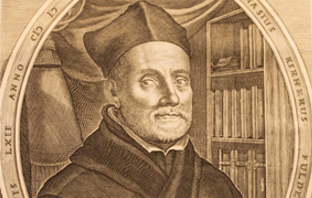Hard on the heels of the recent EMLO redesign and the publication of metadata for c.20,000 largely Protestant letter records originating in the Dutch republic, here at Cultures of Knowledge we are especially thrilled today to be celebrating the release of a major Catholic catalogue of Italian correspondence, that of the Jesuit polymath and scholar Athanasius Kircher. This important occasion is the result of a long-standing partnership between Cultures of Knowledge and the esteemed and innovative Stanford-based project Mapping the Republic of Letters.

Athanasius Kircher. Frontispiece, Mundus Subterraneus (1664). (Bodleian Library, University of Oxford, Douce K 148; image: Marc Kolakowski)
Work on the Athanasius Kircher correspondence project has its foundation rooted firmly in a collaboration between Museo Galileo in Florence, the Pontifical Gregorian University in Rome, and the European University Institute in Fiesole. For the past seven years, the project has been under the aegis of CofK’s esteemed partners, Stanford’s Mapping the Republic of Letters where, benefitting from the supervision of Paula Findlen, researchers Iva Lelková and Suzanne Sutherland-Duchacek have worked to enrich the original database with, in particular, geographic and prosopographic information. Today a total of 2,741 letters is published in EMLO with each letter record linking through to the Stanford project: 2,686 of the letters are from Kircher’s own correspondence (of these, 2,259 are housed in the archives of the Pontifical Gregorian University), and 55 related letters also from the Pontifical Gregorian University are published in addition. Kircher’s correspondents included scientists, mathematicians, missionaries, and state leaders, many of whom are involved in the intricate networks being reconstructed here in EMLO.
This is a very exciting time for the project, as the number of correspondences included in EMLO increases, and with a rolling schedule of publication planned for the coming weeks and months. EMLO is a platform for accessing an ever-expanding number of resources, each of which enriches the whole with carefully formatted and standardised metadata, on people, places, networks, and the letters themselves. As well as being continually possible to add to, correct, and enhance this information (unlike in print), linking and standardising data makes it possible to compare, analyse, and visualise early modern correspondence like never before, resulting in many exciting possibilities as we look to expanding our technological as well as editorial horizons. The correspondence of the learned and wide-ranging Kircher is a most valuable addition indeed; go and have a browse!

